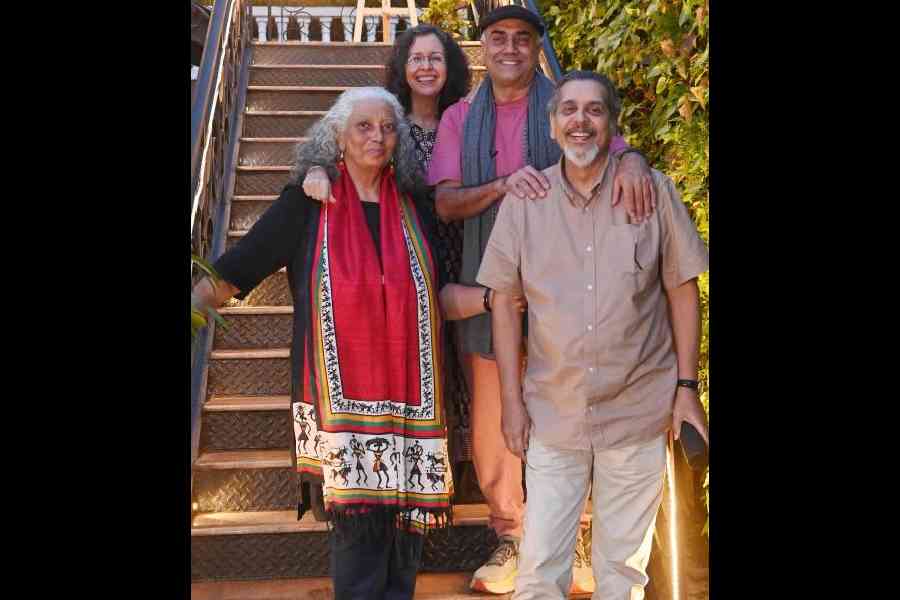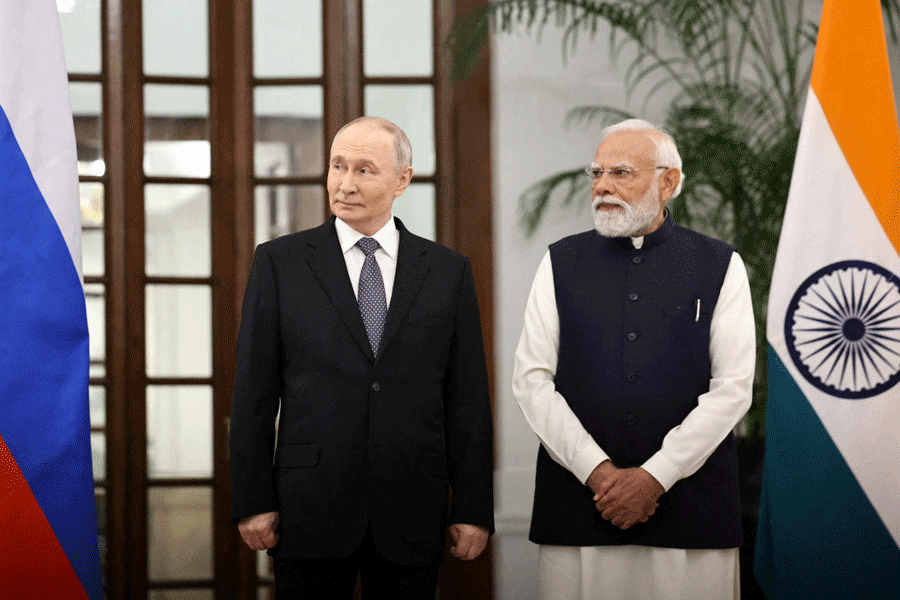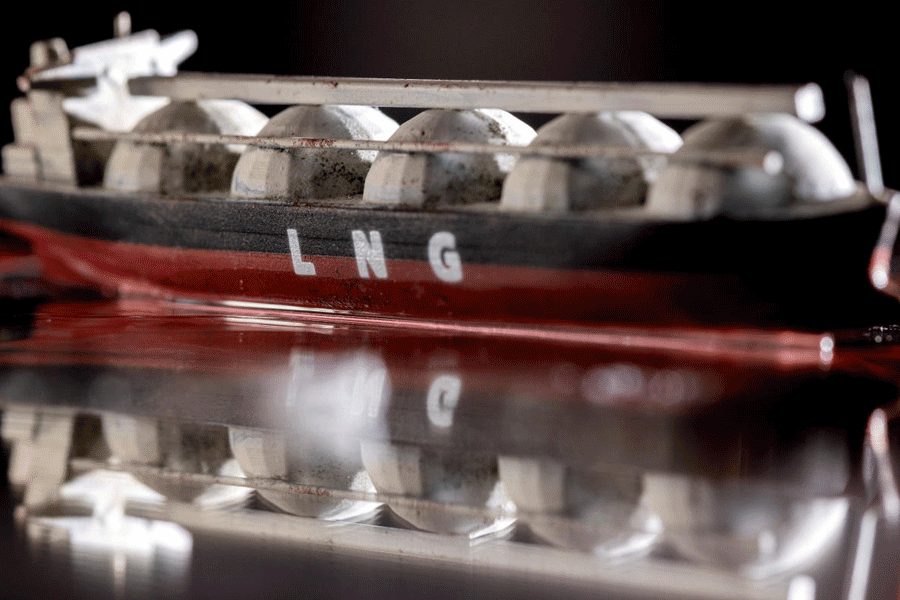Thanks to the efforts of the Anamika Kala Sangam, director Rahul da Cunha’s The Siddhus of Upper Juhu travelled to Calcutta for the first time since 2016 last month, playing to a packed GD Birla Sabhagar on September 13 in a show that brought to the audience laugh-out-loud moments as well as serious reflections on the uncertainties of life. The Rage Productions play, buoyed by Rajit Kapur and Shernaz Patel, also features Shishir Sharma, Meera Khurana, and Kajli Sharma, and depicts a Punjabi-Parsi couple caught in the dysfunctional whirlwind of middle-class Mumbai life. t2 caught up with four of the five actors for a brief chat the day before the show to find out more.
You are here just before Durga Puja, and I hear you’ll be playing a houseful show tomorrow. How does it feel to be in Calcutta knowing people are gearing up for the festive season, but also actively choosing to make time for the arts?
Rajit Kapur: We first opened the show in Mumbai in March 2016, and then we came here in August, before we went to Singapore.
Shernaz Patel: It’s a lovely time, of course. Any time is a lovely time, I think, to come to Calcutta. I love coming here.
Rajit: Because there is a regular theatre-going audience in Calcutta. The crowd is very discerning here. And they understand, whether it’s the nuances or the layering of things, which sometimes, honestly, when we go to Delhi, the audience is just there to have a good time, period. Here, people will actually pull you to shreds if you don’t hit a mark. The critical evaluation of what you do… it’s very hawk-like! So it’s good. It keeps you alert, and that’s what makes you give your best.
Meera Khurana: For me, it’s very nostalgic because I started my schooling in Calcutta, in Loreto Dharamtala, and lived right opposite Victoria Gardens! So the last time I came, I made it a point to go around and spot all those childhood places. It was a great experience.
On another front, we’ve now become like a family. So when we’re travelling together, we feel happy.
Shishir Sharma: There’s a certain comfort level. We have a great time, really. It’s very rare that you have a good time with a group, and we’ve been together for, what, 10 years now…
Rajit: And ours is a small group. It’s five actors and five crew members.
Shishir: So we’re always in a group of 10, maximum 12…
Rajit: But I think the most important joy is also that we trust each other.
The play has somewhat become a classic over the last 10 years and received glowing reviews everywhere. What does it feel like to be part of something that audiences across countries have resonated with and welcomed so warmly?
Shishir: It’s mad!
Shernaz: Actually, because it’s set in Mumbai, when we first opened it, we were really worried whenever we went anywhere else with it, because we didn’t know how people would respond. And so, the first time we went to another city and got almost the same response, it just felt like… wow! I just think city life is a subject that anyone in any city will be able to relate to. Even here in Calcutta, that’s what we hope people will resonate with the most.
Do you think that the relatability factor makes it sellable to everyone, irrespective of location?
Meera: That’s just what I was going to say. People are able to relate to something or the other in the storyline. There are references to construction sounds, or plumbing going wrong, aeroplanes flying around... urban problems! The stress of it!
Rajit: I would say another magical thing was, in the month of May this year, we had a show in Mumbai, at the same NCPA venue where we opened exactly 10 years ago. It was a houseful show, and it felt like opening night. And we couldn’t explain to each other what happened. Shishir was in a wheelchair because he had broken his leg, but the show had to go on. But there was something that happened.
Shishir: But, Raj, every show we do, something or the other happens, and it feels like opening night! (Laughs)
Shernaz: And I think because of the stress that we all live in, we want the ability to laugh at our damn lives. Like, to just observe, this is how we live, and to laugh about that is a great feeling.
Shishir: Leave alone the audience laughing, we laugh backstage… this is after 10-11 years of having done this play!
Rajit: The thing I found, which never really struck me before, is that the play becomes relatable in cities because of the mix of communities that exists in them. Like in the play, you have this Punjabi family, and then there’s this Parsi lady in the middle of it all. In cities, which are far more cosmopolitan in nature, that layering really connects. Somebody from the audience once pointed it out to me — that the multicultural life of a city, and the fact that two separate communities come together within this one couple, is another form of reaching out to people. We had never thought about it ourselves. We took it for granted; it was just part of our play. But that cross-pollination of communities is something we didn’t realise was reaching out to people in such a big way.
Shernaz: And it’s also very poignant because the play talks about middle age and about having a purpose. I don’t want to say too much, but the point is that change happens, and being accepted after a certain age by society becomes tricky business. A lot of the play also deals with that.
Rajit: There is a line in the play where X, let’s say, loses their job. And I remember in one show, the audience just gasped out loud. It had a completely different kind of reaction than what we were used to. What it means to lose your job in the city, to survive without it when you are a certain age. So, these are some things that maybe initially we just took for granted, but really are the connecting points with the viewers.
Shernaz: And that’s, I think, the beauty of the play, because it makes you laugh, but there’s a whole underlying layer of reality.
You mentioned the aspect of ‘cross-pollination of communities’ being pointed out to you by the audience, rather than coming up with it yourselves. Does anything about the play surprise you, so many years later?
Shernaz: The fact that after 10 years, it’s still a houseful show!
Rajit: And that people come back and say, “Even though it’s our fourth or fifth time watching, we really had a good time. We didn’t know where those two hours went.” That makes us feel really good at the end of the day. That somebody else is feeling good because of what we have done. That’s all that you want, as artistes.
And there are people who come and say, “When is the next show? We’d like to come again.” So that really makes us feel good. And therefore, as you said, we look forward to more shows. It doesn’t take more than 10 minutes for each of us to respond to each other when there’s an enquiry for a show. Otherwise, it takes days for people to say whether they’re free or not. Here, within 10 minutes, we come to a consensus.
Meera: Also, people connect with the characters. And then when something goes a little awry with them, people really feel for them, so they understand where they come from and what they must be going through.
So, I’ve always worked through my life. And for the last three-four years, I haven’t been doing anything. I gave up. I just decided ki Covid and all… so yeah, nothing. And I was telling my elder son the other day, “Akarsh, I have a lot of time on my hands. I’m not doing anything. I only go swimming and I do my puzzles in the evening.” And this after being very actively involved in things all my life. And he turned around and told me, “Mom, but you have Siddhus.” And really, it’s become a running gag with us since.
I lost my sister 10 days ago, and Rajit called me and I was saying to him, “I’m heavy-hearted, I’m sad,” and so on... then even he said, “But you have Siddhus.” I think at this point, it’s become part of our lives.
Rajit: And I hadn’t even meant to say it that way! I had called her to offer condolences, but that’s what came out of my mouth!
Meera: And everyone was so happy that the show had to go on. Because they all thought I’d get distracted, but they were relieved. They were like, “She’s got Siddhus, she’ll get out of the house. She’ll have a good time with the rest of them.” They didn’t want me to dwell too much on what had happened.
Rajit: And we’ve learned and seen and grown so much with Siddhus, too, you know, with each show. That first show Shishir did in the wheelchair, he was in actual pain! And we were also a bit on edge then, but now it’s one of those things we’ve taken in our stride.
Meera: And no one watching would have ever known that the wheelchair wasn’t in the script.
Shernaz: Watching from outside, you would really think that that’s how the character was. It’s a comedy, after all…
Shishir: So when I finished the show, three ladies came up to me and asked, “Sir, are you really injured?” It was a lark!
Rajit: The thing is, despite all the moving around we do to accommodate certain situations, it doesn’t really affect the core or the tone of the play. Sometimes, it makes the play better for it. In fact, in one of those shows in which he was finally out of the wheelchair and able to totter around on a walking stick, Shishir and I had to do a scene together, and something was different about it somehow. It just had a different dimension. We still can’t figure it out.










